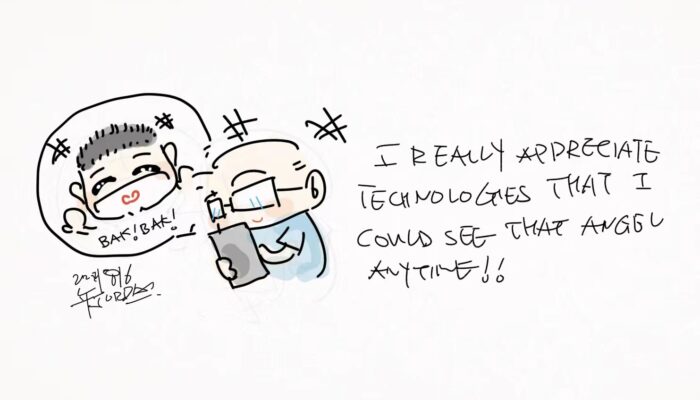
8-6 #Technologies : World chip sales growth has decelerated for 6 straight months; Sony expects demand for CIS for high-end smartphones to remain robust this year; Amazon has acquired iRobot; etc.

Apple has reportedly asked suppliers to ensure that shipments from Taiwan to China strictly comply with Chinese customs regulations. Apple has reportedly told suppliers that China has started strictly enforcing a long-standing rule that Taiwanese-made parts and components must be labeled as being made either in “Taiwan, China” or “Chinese Taipei”. Apple has urged suppliers to treat the matter with urgency to avoid possible disruptions caused by goods and components being held for scrutiny. Using the phrase “Made in Taiwan” on any import declaration forms, documents or cartons could cause shipments to be held and checked by Chinese customs. Penalties for violating such a rule is a fine of up to CNY4,000 yuan (USD592) or, in the worst-case scenario, the shipment being rejected. (CN Beta, Asia Nikkei)

Google-owned Fitbit is gearing up to launch a slew of wearables under different lineups. The products to be launched include Inspire 2, Sense 2, and Versa 4.(Phone Arena, Twitter, 91Mobiles)
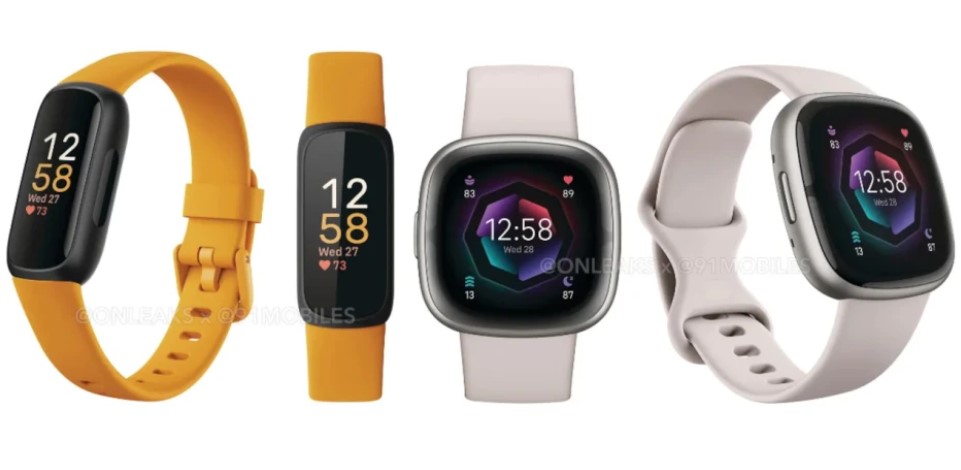

Google Cloud’s Immersive Stream for XR makes possible interactive 3D and augmented reality experiences on mobile, and will soon support augmented and virtual headsets. Google CEO Sundar Pichai has credited “Google Cloud Immersive Stream” as allowing any smartphone to run the new Immersive View in Google Maps, which is just starting to launch. Google Cloud later detailed Immersive Stream for XR as a way to put “users in an immersive, interactive, and photorealistic experience, without having to download an app”. The company believes that “mobile GPUs still struggle to create these photorealistic images”, which are needed to offer a truly immersive experience.(CN Beta, Google Cloud, 9to5Google)


Amazon and iRobot have announced that they have entered into a definitive merger agreement under which Amazon will acquire iRobot. The deal is valued at approximately USD1.7B. Amazon Devices Senior VP Dave Limp focused on iRobot’s ability to “reinvent how people clean”, and said he looked forward to inventing products.(The Verge, Engadget, Business Wire)

The global economy appears to have lost considerable momentum into midyear, raising concern that a 1H22 mid-cycle slowdown could magnify into a far more damaging descent into recession. As is often the case, the global goodsproducing sector is at the leading edge of growth dynamics. The resilience of final goods demand in the face of diminished purchasing power through 2021 has given way to outright contraction in recent months. As a result, global factory output declined in 2Q22. A COVID-related slump in China dominated 2Q22 downdraft, but this is now reversing. Combined with a purchasing power lift to the US from falling gasoline prices, the global goods sector should get a welcome boost this quarter. However, JP Morgan is doubtful that any lift is sustainable as dark clouds are gathering. A sharp slide in consumer and business sentiment looks likely to weigh on final demand. In addition, the pace of stockbuilding has picked up but is likely to slow in response to fading orders. (JP Morgan report)
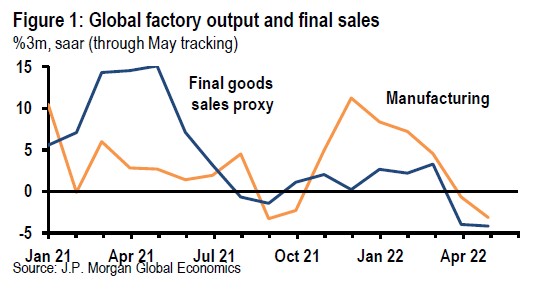
Consumer spending on goods has been weighed down for a full year now by a large purchasing power squeeze that has depressed retail spending. However, the weakness in retail spending intensified in recent months despite robust job growth. Inflation has sharply accelerated reaching a 10.3%ar in 2Q22 and higher interest rates have raised borrowing costs for purchases of homes and durable goods. As a result, real consumer goods spending outside China and Russia fell 1.6%ar in the 3 months through May 2022. (JP Morgan report)
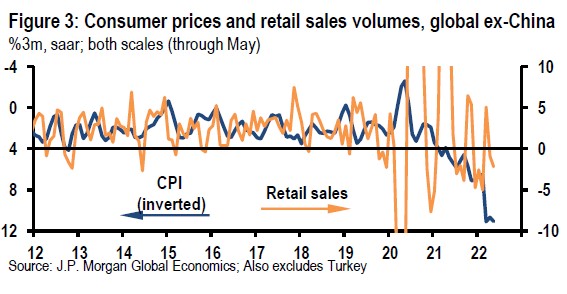

Manchester United has announced a multi-year global strategic collaboration with Qualcomm. The arrangement will feature the Snapdragon brand. Snapdragon platforms power many of the world’s premium smartphones, PCs, gaming devices, connected cars, smart wearables and more. The strategic collaboration will create unique events and experiences for Manchester United fans at Old Trafford and around the world, powered by the premium performance that Snapdragon platforms deliver. In addition, Qualcomm will advise Manchester United on planned improvements to mobile connectivity at Old Trafford, which will enhance fans’ experience on match days.(Qualcomm, CN Beta, GSM Arena)
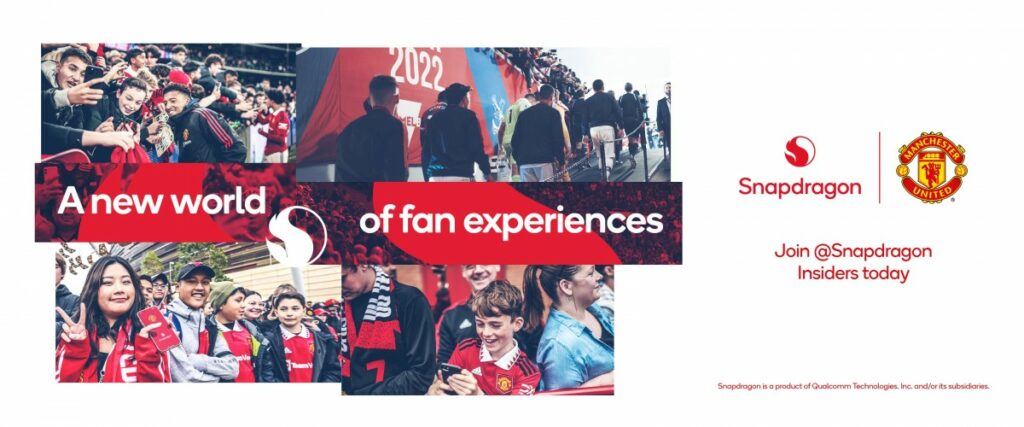
World chip sales growth has decelerated for 6 straight months — yet another sign the global economy is straining under the weight of rising interest rates and mounting geopolitical risks. The 3-month moving average in chip sales has correlated with the global economy’s performance in recent decades. The latest weakness comes as concern about a worldwide recession has prompted chipmakers like Samsung Electronics to consider winding back investment plans. Semiconductors are key components in a world that’s increasingly reliant on digital products and services, particularly during the pandemic when a lot of work and schooling was conducted remotely. Chip sales started to cool as central banks began scrambling to raise interest rates to combat spiraling inflation and Russia’s war on Ukraine and prolonged Covid lockdowns in China prompted a rapid reversal in the international outlook. A Bloomberg Economics global tracker shows the prospects for the world economy have deteriorated rapidly in 2022, coinciding with chip sales beginning to slow. (CN Beta, Bloomberg)
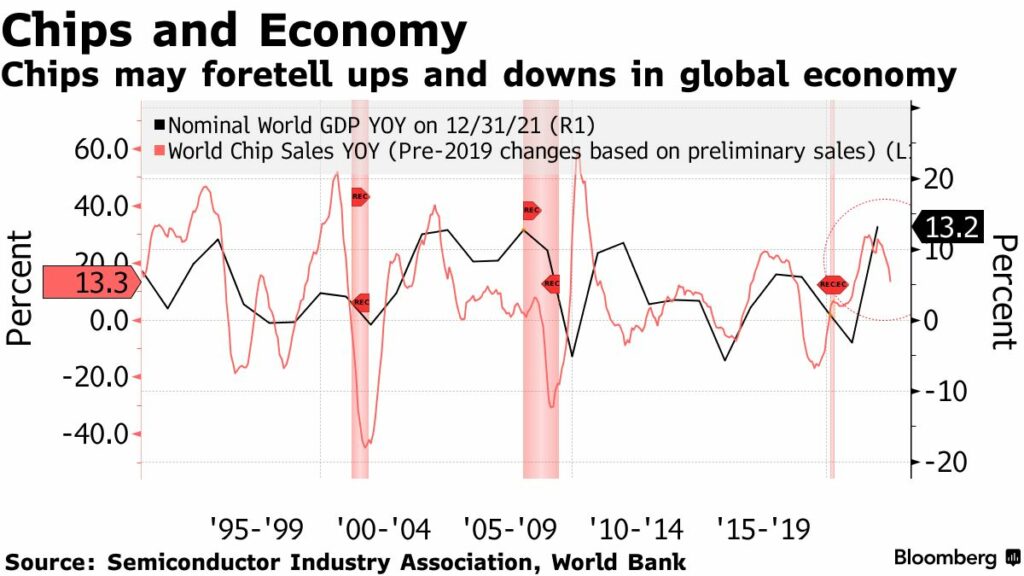
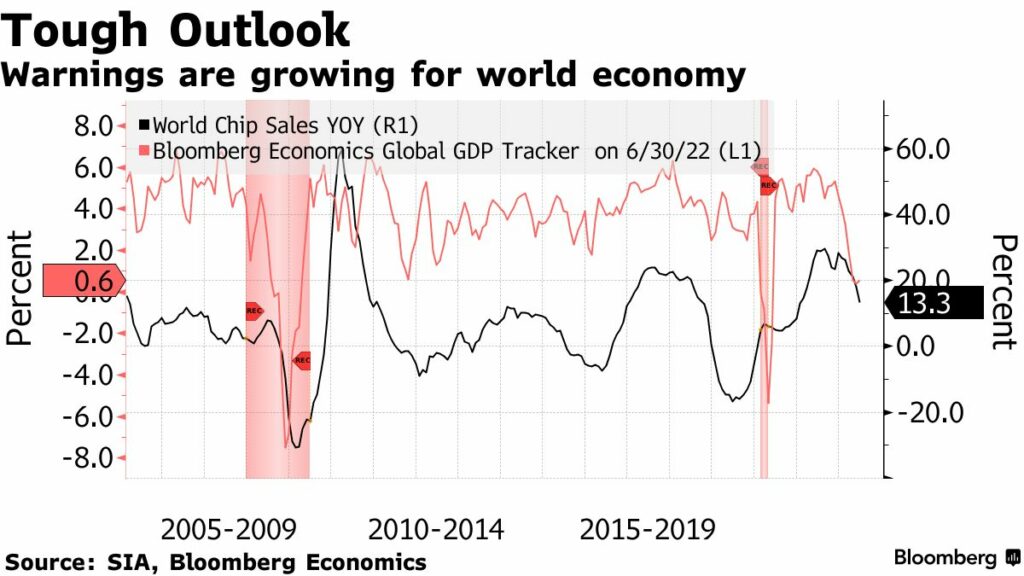
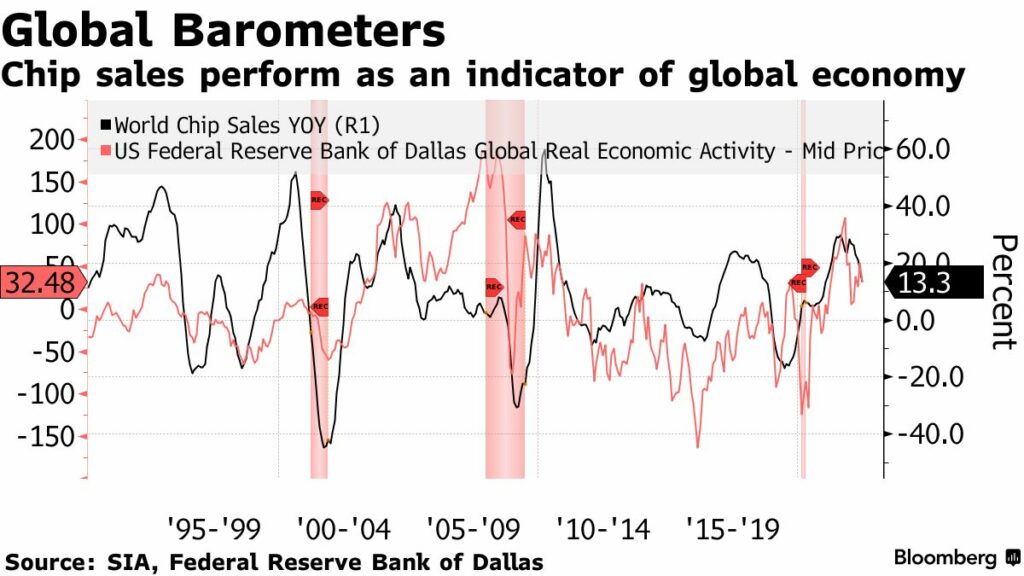
The shortages of computer chips that forced global automakers to scrap production plans for millions of cars over the past two years are easing – at a new and permanent cost to the car companies. C.C. Wei, chief executive of Taiwan Semiconductor Manufacturing Co (TSMC), has said he had never had an auto industry executive call him – until the shortage was desperate. He has revealed that one automaker has called to urgently request 25 wafers who is used to fielding orders for 25,000 wafers. He has replied no wonder they cannot get support. Thomas Caulfield, GlobalFoundries chief executive, said the auto industry understands it can no longer leave the risk of building multibillion-dollar chip factories to chipmakers.(Laoyaoba, Reuters, US News, UDN, CNYES)
The IC market recorded its first-ever June sequential sales decline in 2022, based on data from WEMA, SIA, and WSTS dating back to 1976. Typically, high single-digit or double-digit sales gains have been the pattern for June IC sales. Even in its previously weakest year (1985), June IC sales increased 1%. Never, until 2022, have June IC sales declined. First, June is a quarter-ending five week month and that alone has historically been enough to generate a sales uptick compared to the four-week month of May. Second, June is normally one of the strongest months of the year for IC sales since OEMs are buying chips to build into their new systems in time for back-to-school and end-of-year holiday sales. The biggest contributor to June’s total IC market decline was the sudden and dramatic drop in memory IC sales. A dramatic revenue downturn is not readily evident in the 2Q22 financial results from Samsung, SK Hynix, and Micron since June’s decline offset gains made in Apr and May 2022. However, Micron is forecasting a -17% sales drop for its fiscal 4Q22 (ending in August). Samsung and SK Hynix do not provide next-quarter sales guidance, but it is reasonable to presume that their 3Q22 outlooks are somewhat similar to what Micron has forecast. (Laoyaoba, IC Insights)
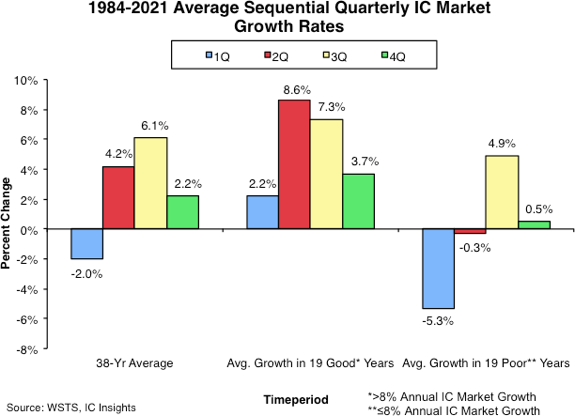
Technological upgrades and product innovations are the direct driving factors for the increase in semiconductor demand. Driven by strong demand in emerging application fields such as 5G, Internet of Things, smart cars, cloud computing, big data, medical electronics and security electronics, semiconductor industry Long-term demand is optimistic, SUMCO expects the compound growth rate of global 12” wafer demand to reach 10.2% in 2021-2025. (Orient Securities report)
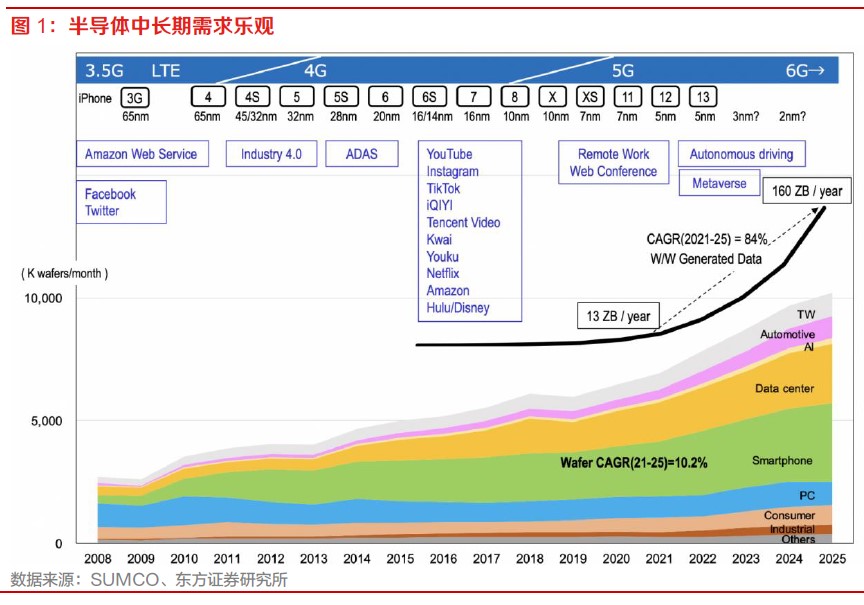
SMIC, a leading foundry manufacturer in China, is currently constructing the SMIC Jingcheng project in 2021 and is expected to gradually enter the equipment procurement stage in 2022. SMIC Shenzhen and Lingang factories also started construction in 2022, with a total investment of over 1,000B for the 3 production lines. The domestic NAND storage leader Yangtze Memory and DRAM leader Hefei Changxin are in the second phase of plant construction. The total investment in the third phase of the two manufacturers exceeds CNY300B, and the demand for equipment will continue to be released. (Orient Securities report)
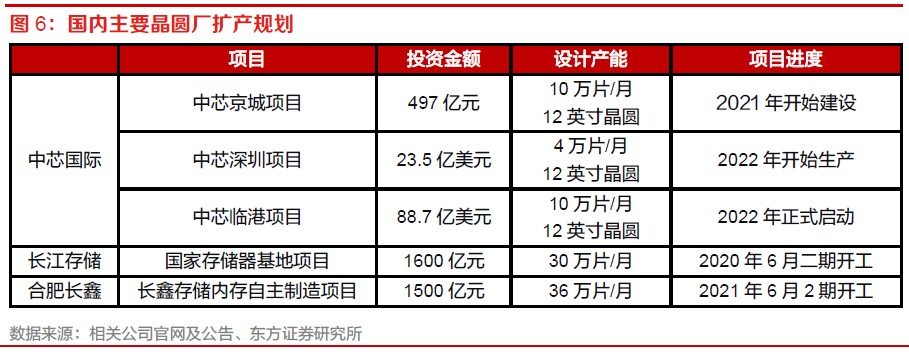

Samsung Electronics reportedly has lowered its LCD TV panel procurement target for this year to 35M units from the previous amount of 47M units and has stepped up efforts to cut panel inventories, according to Digitimes. In late June 2022, Samsung notified suppliers to suspend the delivery of components until the end of Jul. Later, it was also reported in the industry that the suspension of delivery would last until Aug. However, recently, some panel manufacturers said that they are still shipping to Samsung, but it is true that Samsung strictly controls inventory. Samsung’s TV panel inventory level has dropped from the previously rumored 16 weeks to the current 11 to 12 weeks. The industry reported that Samsung hopes to control the inventory within 8 weeks. (Digitimes)
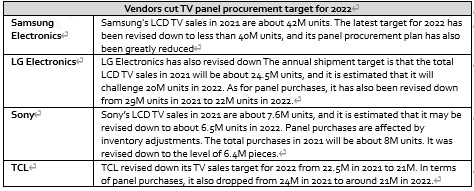

Although global demand for entry-level and mid-range smartphones tends to decline, Sony expects demand for CMOS image sensors (CIS) used in high-end smartphones to remain robust in 2022, according to Digitimes. Sony will reportedly expand CIS production capacity in 2023, but Sony executive vice president and chief financial officer Yuichi Oshima has said that if sales of high-end smartphones in 2H22 are lower than initially expected, Sony will delay the expansion plan. Earlier, Teru Shimizu, president of Sony Semiconductor Solutions, a subsidiary of Sony’s semiconductor business, has revealed that Sony will increase the production capacity of its main image sensor factory, Nagasaki Plant (Isahaya City, Nagasaki Prefecture). Sony also expects the advanced smartphone image sensor market to expand by about 10% annually by 2030. Sony will increase investment in image sensor equipment by 200 billion yen from the original plan to JPY900B in 3 years by fiscal year 2023 (Mar 2024). (Laoyaoba, Digitimes, Digitimes)

Samsung SDI’s spending in 2022 to expand its battery production capacity is expected to exceed that of 2021. The company is expected to especially focus on expanding its cylinder battery production capacity. Samsung SDI has spent around KRW2T on facilities in 2021 and 2022 the figure is expected to be close to KRW3T. The company is expanding its second factory at Goed, Hungary; its joint venture with Stellantis is also expected to start building their factory. Samsung SDI has also announced a KRW1.7T spending plan in Malaysia where it will manufacture 4680 batteries with longer lengths.(Laoyaoba, The Elec)
General Motors (GM) has recently secured a 6-year lithium supply deal with Livent Corp, a US-based lithium products maker. The company also supplies BMW. It has revealed that GM is prepaying USD198M for the purchase. Livent will begin offering lithium to GM at a contractual price per tonne. It is unusual in the mining industry to prepay cash for a guaranteed deal. Therefore, the purchase showed that GM is determined to achieve its goal to produce 1M electric vehicles (EV) each year in North America by 2025.(Digitimes, Electrek, Reuters)
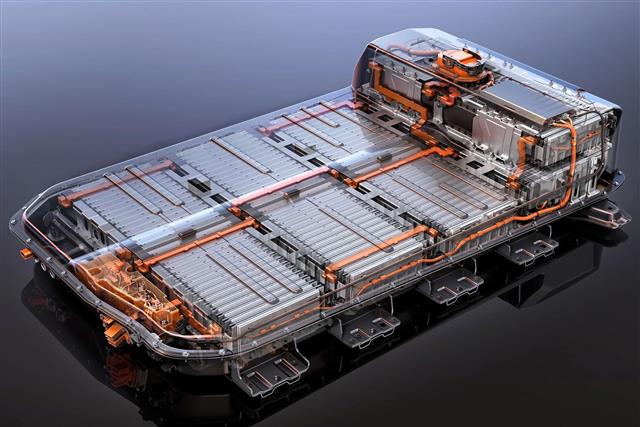
Tesla CEO Elon Musk has said that Tesla could mass-produce 4680 cells by the end of 2022. He revealed that Tesla may not be confident of high production rates until the end of 2022, but this will not affect their car production. They have ample supply of batteries from suppliers and can produce 1.5M cars in 2022. So the 4680 battery will not constrain their car production at the moment, but will be very important for production in 2023. He also added that Tesla aims to have weekly production of 4680 cells at its Gigafactory Texas exceed that of the pilot line at Kato Road by the end of 2022.(Teslarati, CN Beta, Twitter)